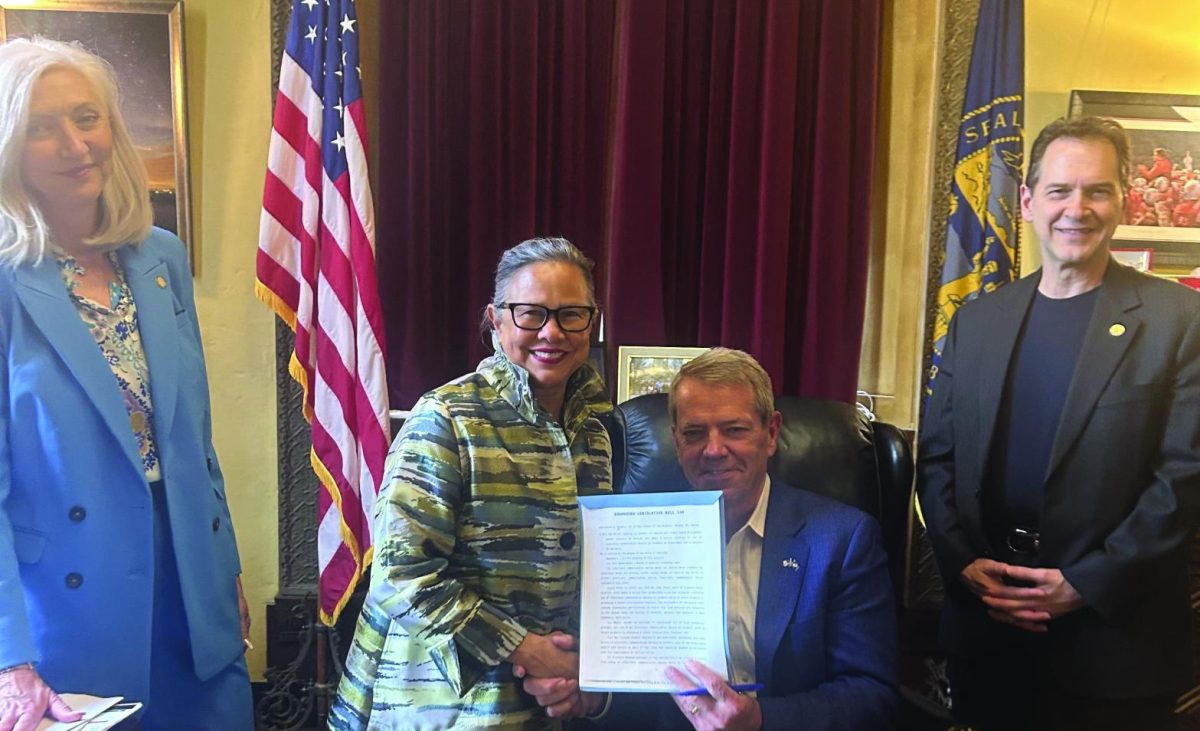On May 8, the 47th president of the U.S., Donald Trump, reached his 100th day in office, which marked a milestone of massive and controversial changes. On the first day of his second presidency, Jan. 20, Trump enacted changes such as renaming the Gulf of Mexico to the Gulf of America, restoring the death penalty, and freezing foreign aid. According to the Pew Research Center, Trump’s approval ratings have dropped to 40 percent since then, due to public dissatisfaction with some of his actions. Here is a look a some of the changes he enacted in the first 100 days:
TRANSGENDER RIGHTS AND LGBTQ+ POLICY
Since his return to office, Trump has demonstrated a focus on transgender and nonbinary people with executive orders. He made his first move by ordering the government to recognize two sexes of male and female. Just three days later, he pushed for transgender inmates to go to a prison based on their biological sex.
His next move was on Jan. 27, where he pushed for changes in military protocol concerning people who identify as transgender, and then restricted gender-affirming treatments for minors the next day. The Pentagon has identified over 4,200 active service members who were diagnosed with gender dysphoria but the number of transgender service members is said to be higher by advocacy groups. Recently on May 6, the Supreme Court allowed for the President to move forward on bans for transgender people in the military. The reasoning behind banning those with gender dysphoria, usually transgender individuals, from the military is that gender dysphoria is classified as a mental health issue by the Department of Defense. The White House released an article titled “Prioritizing Military Excellence and Readiness” addressing their motive about this move that states, “beyond the hormonal and surgical medical interventions involved, adoption of a gender identity inconsistent with an individual’s sex conflicts with a soldier’s commitment to an honorable, truthful, and disciplined lifestyle, even in one’s personal life.” Later in the article it also states, “for the sake of our Nation and the patriotic Americans who volunteer to serve it, military service must be reserved for those mentally and physically fit for duty.”
Transgender people and allies identify the election results as a major setback for them and their rights, but other demographics support the changes to enlistment requirements and other regulations. It seems that opinions on this subject vary among Americans depending on multiple factors. “Overall,” according to a survey with over 120,000 respondents in an AP News article by writer David Crary, “55% of voters — and 85% of Trump backers — said support for transgender rights in government and society has gone too far.”
President Trump has also had certain words removed from government websites concerning these issues. Some examples are “climate crisis”, “identity”, “inclusion”, “mental health”, “oppression”, “political”, “pollution”, “privilege”, “race”, “status”, “trauma” and “victim”. However, some of the population feels that the words seem targeted to specific groups, which is causing unrest. Many of the words are perceived to be aimed towards LGBTQ+ and transgender people, words like “biologically female” or “biologically male”, “LGBTQ”, “orientation”, “assigned at birth”, “they/them” and “transgender”.
TARIFFS AND TRADE WARS
One of Donald Trump’s biggest topics of discussion is involving tariffs on other countries, in order to encourage less dependence on other countries’ economies, among other reasons. His most drastic step was imposing a 145 percent tariff on Chinese goods. There are three categories of tariffs imposed, relating to specification of locations or goods. His main reason for imposing said tariffs pertains to national security, specifically the importation of illegal drugs such as fentanyl into the United States. The White House released an article on Feb. 1, 2025 that says, “ADDRESSING AN EMERGENCY SITUATION: The extraordinary threat posed by illegal aliens and drugs, including fentanyl, constitutes a national emergency under the International Emergency Economic Powers Act (IEEPA).”
Category one is country-specific. This is where the International Emergency Economic Powers Act (IEEPA) and fentanyl tariffs come in. On Feb. 1, President Trump signed executive orders for 25 percent tariffs on Canada and Mexico, and 10 percent tariffs on China that were to take effect Feb. 4. Trump also announced on Feb. 27 that an additional 10 percent would be added on to take effect March 4.
There has been some variation in the application and rates of these tariffs. Since these tariffs were initially announced, the President has enacted some suspensions, reductions, and exemptions that have been confusing to some economists and consumers alike. Tariffs were also adjusted in response to retaliatory tariffs enacted by other countries, for example, when Canada retaliated to Trump’s tariffs the administration doubled tariffs on steel and aluminum (although these tariffs were also reversed). These “reciprocal tariffs” are what led to the 145 percent tariff on China, with the exemption of some electronics on April 9.
The second category is product-specific tariffs. On Jan. 27, Trump announced semiconductors and pharmaceuticals would be tariffed. Steel and aluminum already had tariffs on them due to Section 232, which allows the president to have broad power over imports. Another tariff that is justified under Section 232 is on auto imports and parts. Both products faced 25 percent tariffs, tariffs on auto imports took place on Apr. 3 and tariffs on auto parts took place on May 3. The importation of copper and lumber are also under investigation and may potentially face tariffs as well, for reasons concerning national security.
Finally there’s retaliation tariffs against three geographic areas. Chinese retaliation tariffs are due to alleged illegal importation of fentanyl, and the tariffs include universal retaliation on all goods. Retaliatory tariffs on Canada’s imports are also related to fentanyl, and there are two additional tariffs on the auto industry and the steel and aluminum industry. Lastly there’s the European Union, which is facing retaliation tariffs that would increase tariffs that are previously established by Section 232.
A large benefit of these tariffs is that, combined, they would increase US federal tax revenue by $2.1 trillion, according to the Tax Foundation. Federal tax revenue is money the government collects from various forms of taxes (tariffs are a form of tax), which is then used to fund government programs and services such as social security, national defense, Medicare, infrastructure and education.
IMMIGRATION ENFORCEMENT
Trump’s most controversial initiative as of right now, however, is immigration and his enforcement of immigration control through Immigration and Customs Enforcement (ICE). On day one of his second presidency, he reinstated a policy called “Remain in Mexico”, which meant that immigrants looking for asylum had to wait in border cities while their immigration court cases were in progress. On Jan. 28, he revoked deportation protections for Venezuelans who were originally protected due to a severe humanitarian crisis in Venezuela. The following day Trump announced that migrants will be held in Guantanamo, however, the camp set up is said to be relatively empty according to the Global Detention Project. The Guantanamo naval base in Cuba was intended to hold 30,000 migrants, as of Jan. 29. However, since then satellite images have shown roughly two-thirds of the 260 tents installed have been removed, because only a small number of migrants were actually held there.
According to NBC News, ICE has been sweeping its way across the United States in search of undocumented immigrants. According to the article, “The Trump administration is planning to conduct major immigration raids in three U.S. cities per week.”
One of the people ICE arrested is a 29-year-old man from Maryland named Kilmar Abrego Garcia. This arrest specifically was due to the accusation that Garcia is a member of the gang MS-13, but his wife, Jennifer Vasquez Sura, and others have repeatedly denied this claim. Additionally, records of abuse and potential human sex trafficking concerning Garcia, but both claims were dealt with privately, according to BBC News. There have been many protests and legal issues in relation to this case, which is getting national attention. The case has spread quickly in the United States, and even the Supreme Court got involved. Their order was for President Trump to facilitate Garcia’s return home, but whether he will come home or not is still to be determined.
Regardless of the outcome of all of these actions, one thing remains clear: the President and Trump Administration will keep making big changes that will affect the American people for at least the next four years. There are many mixed opinions on the movements that this administration has made, and likely the disagreement on whether or not these changes are positive will continue. However, it is important for all readers to remember that regardless of political opinion, we should still be educated on all sides of an issue.








